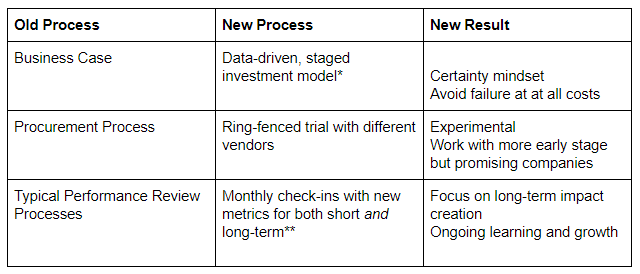Culture Eats Strategy Eats Culture for Breakfast


Peter Drucker’s famous musings that culture eats strategy for breakfast rings as true today as it did then.

We can establish strategies to help us become an innovative organisation but if we neglect our culture and the behaviours required to support innovation then it’s all for nought! On these behaviours, Clayton Christensen’s outlined several in his book The Innovator’s DNA, including challenging the status quo, associational thinking, networking and experimentation.
Yet, if your organisation is plagued by complying with ‘the way things have always been done around here’ narrative, avoiding risk and failure at all costs, taking few big bets which each involve a 10-person or more steering committee (of people who are usually ill-suited to be advising on said subject matter), sitting in meetings to prepare for meetings to prepare for meetings, silo’d departmental lines and an IT department that needs everything to go through QA, then your people are quite unlikely, if not almost certainly not going to, demonstrate said behaviours required to move the needle on innovation.
But what if you had a strategy in place to change the culture?
Culture, usually, is simply a manifestation of the processes, systems and values inherent at an organisation.
How Processes Affect Culture
Here’s some typical corporate processes and the resulting attitudes and outcomes.

However, if you re-design these processes and the supporting ecosystem of values and systems, then people’s behaviours - over time - will either adjust to align with something more representative of the culture your organisation is trying to create or they will leave which is not necessarily a bad thing if their values don’t align with your organisation’s. It’s far worse if they stick around and pollute the well with destructive cynicism.
ADVERTISEMENT
ADVERTISEMENT
New Process, New Culture

*Data-driven, staged investment model
**Here’s how.
Identify Your Blockers
Dave Gray and Alex Osterwalder collaborated on something they call the Culture Map (download one here) that forces you to identify all of the blockers, by way of process, systems or values, that prevent desired behaviours in your organisation.
Like anything, step one is acknowledging you have a problem, so using something like the culture map helps you to identify areas to focus on. It’s your job to then prioritise them in some sensical fashion - one method I like is the ICE method (score each problem out of 10 for Impact, Confidence and Ease, tally up the scores and start with the highest ratings).

Choose Your Focus Area

In the above case you might want to start with using Amazon Web Services to run experiments instead of, say, needing to host every little experiment on Core IT which subjects it to QA, typical IT processes and slows down experiments to the point where your ‘build, measure, learn’ cycle, as define in the Lean Startup, is nowhere near fast enough to move the needle and keep employee morale high.
You then might want to move on to revisiting your performance and procurement reviews.
In summary:
Ergo, strategy eats culture eats strategy for breakfast.
.png)
The WorkFlow podcast is hosted by Steve Glaveski with a mission to help you unlock your potential to do more great work in far less time, whether you're working as part of a team or flying solo, and to set you up for a richer life.
To help you avoid stepping into these all too common pitfalls, we’ve reflected on our five years as an organization working on corporate innovation programs across the globe, and have prepared 100 DOs and DON’Ts.
ADVERTISEMENT
ADVERTISEMENT